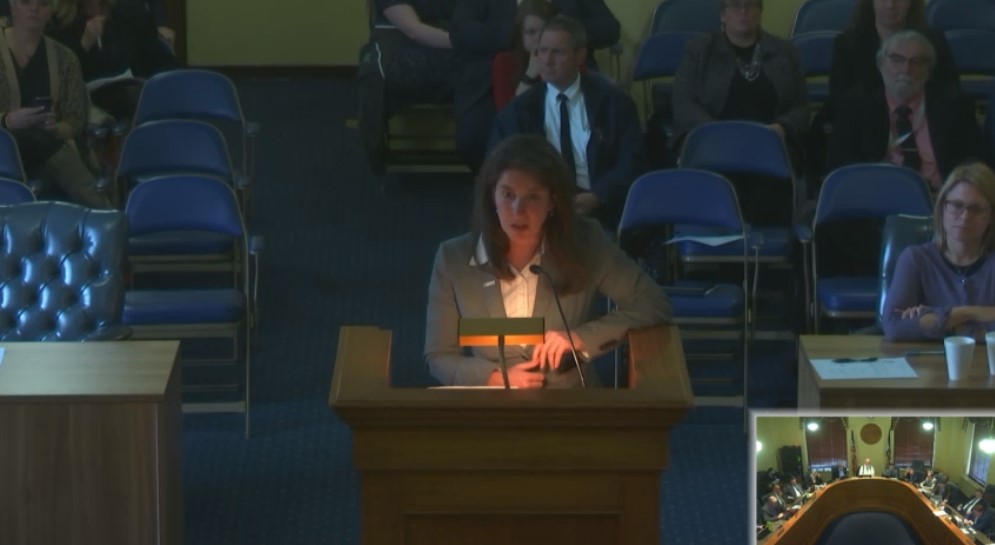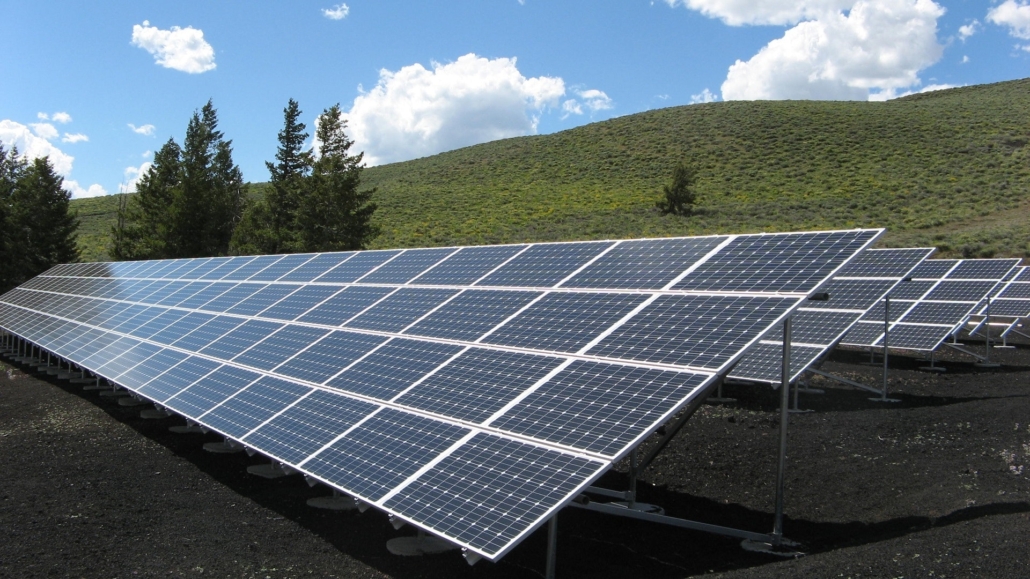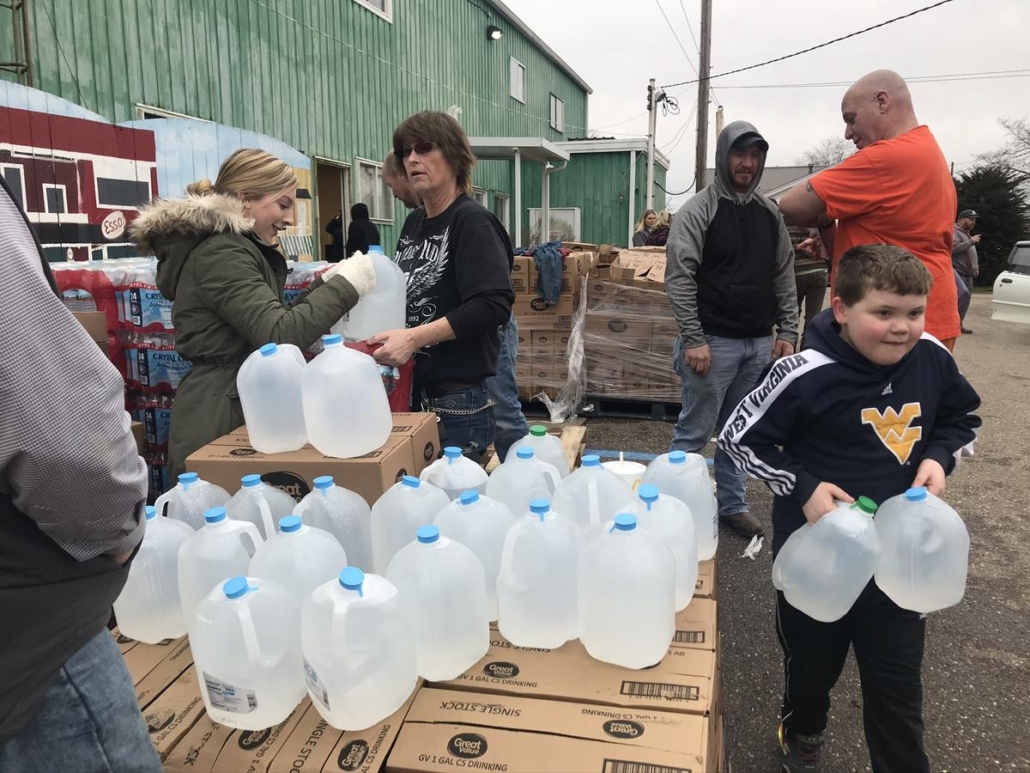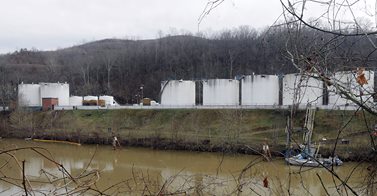Water Policy News: Week 6 of the 2020 Legislative Session
Senate Committee Passes Resolution to Study PFAS in Drinking Water
WV Rivers’ executive director testifies before the Senate Judiciary Committee.
Yesterday, 2/20, the Senate Judiciary Committee took action on PFAS in drinking water with the passage of Concurrent Senate Resolution 46 to initiate a study to identify the presence of PFAS in drinking water supplies.
While this CSR 46 doesn’t provide the all the provisions outlined in the Clean Drinking Water Act of 2020, it is an important first step towards protecting our water and health from toxic PFAS which are known to cause cancer and other serious ailments.
The Resolution requires the WVDEP and DHHR to sample raw water supplies at 259 locations across the state to detect the presence of PFAS. It also aims to determine the source of the PFAS and how it entered the water. Starting in 2021 reports on the results of the study must be made to the legislature on a semi-annual basis.
Our executive director, Angie Rosser, provided testimony during the committee meeting in support of the resolution, but expressed disappointment in the prolonged timeline outlined in the resolution. Angie also urged committee members to take further steps to create an inter-agency response team to protect public health when PFAS are detected.
The Senate Judiciary passed the Resolution unanimously with recommendation for adoption by the Senate.
Solar Bill Passes Senate; Next Stop is House Judiciary
This week West Virginia Senate unanimously took a step towards the future with the passage of SB 583, a pro-solar bill. Now the bill is headed to the House Judiciary committee for consideration. While the bill itself is rather conservative, it is a big step forward in recognizing the importance of renewable energy in West Virginia, especially with heavy opposition from the fossil fuel industry.
The bill would allow West Virginia’s electric utilities to develop solar projects and use the produced electricity. Currently, West Virginia is ranked 48th in the nation for its use of solar and the West Virginia Commerce Department has realized that the low ranking is keeping new business away. Learn more here.
Rural Water Systems Get Boost with HB 4953
Volunteers handing out water in Paden City, WV. Photo by Brittany Patterson, WV Public Broadcasting.
So many of West Virginia’s rural public water utilities are struggling with dated infrastructure and inadequate technology to treat water. A report published last fall on Safe Drinking Water Act (SDWA) violations found that more than half of West Virginia’s counties fell with in the bottom third of the nation in SDWA violations.
This chronic problem is highlighted in Paden City, WV where the water supply is contaminated with a dry cleaning chemical and the cash strapped community had to apply for emergency funds to build a new filtration system.
While contamination shouldn’t happen in the first place, or it should be stopped at the source, like the Clean Drinking Water Act of 2020 aims to do, small utilities still need resources to ensure they are delivering safe water.
A bill, HB 4953, aims to take steps to make sure tap water is safe by identifying failing water utilities and developing plans to either improve the utility or replace it with another provider. HB 4953 is currently in the House Judiciary. Learn more here.
Office of Just Transition Bill Heads to House Floor
The bill to create an Office of Just Transition & Advisory Committee, HB 4574, has passed two committees in the House and is headed to the House floor for a vote.
The bill aims to assist communities affected by the decline of coal with a community-led advisory committee to help them identify and receive the resources they need to diversify and reignite their economies. Learn more here.
Bill to Deregulate Oil & Gas Tanks Near Drinking Water Intakes Stalls
So far it looks like the bill that would exempt oil and gas storage tanks from the Aboveground Storage Tank Act has stalled in committee and will not move forward this session. The bill, HB 4079, would deregulate oil & gas aboveground storage tanks that are located within zones of critical concern (ZCCs), or the areas directly upstream from public drinking water intakes.
The legislature has heard loud and clear that West Virginians oppose this bill. Over 900 people have contacted members of the House Energy Committee opposing the bill. Next Wednesday marks the deadline for bills to “cross-over” to the other chamber, we are cautiously optimistic that HB 4079 will die in committee.
2020 Legislative Session: Tracking Water Policy
The West Virginia legislative session kicked-off on Wednesday, January 8 and will run until March 7. WV Rivers will be there as the voice for safe, clean, wild rivers and streams.
Below you’ll find some of our Water Policy Priorities and their current status. View our bill tracker on the WV Rivers’ website for the latest on each bill as they are introduced.
HB4079 – Altering the definition of an aboveground storage tank. We oppose this bill that exempts certain tanks used by the oil and gas industry closest to public drinking water intakes from the Aboveground Storage Tank Act.
Status: In the House Energy Committee.
HB 4542 / SB 679 – Clean Drinking Water Act of 2020: We support this Act, which addresses the risks posed by group of unregulated chemicals called polyfluoroalkyl substances, or “PFAS”. PFAS are man-made, persist in the environment, and are known to cause cancer and other adverse health effects.
Status: HB 4542 in House Health and Human Resources Committee; SB 679 in Senate Judiciary.
SR 46 – Studying PFAS Presence in Drinking Water Sources: This resolution requires the WVDEP and DHHR to sample raw water supplies at 259 locations across the state to detect the presence of PFAS.
Status: Passed Senate Judiciary; to be voted on by the Senate.
Recommendations of the Public Water System Supply Study Commission: We support the implementation of recommendations of the WV Public Water System Supply Study Commission, which was formed in response to the 2014 WV Water Crisis. Originating Bill dealing with recommended notice of permit violations to downstream water utility.
Status: Recommended for an interim study by the Senate Energy, Industry and Mining subcommittee.
HB 3049 – Improving Dissemination of Boiled Water Advisories to Affected Communities: When drinking water is unsafe the public needs to know quickly. This bill requires water utilities to make customers aware of boiled water advisories through a text and voice alert system.
Status: Passed the House and is in the Senate Health and Human Resources.
Status: Passed the Senate; in the House Judiciary Committee.
HB 4787 – Updated Penalties for Water Quality Violations: We’re seeing multi-billion dollar pipeline projects repeatedly violate their permits, resulting in harm to waterbodies across the state with relatively minimal monetary consequences. This bill takes steps to deter polluters from breaking the law by allowing the WVDEP to increase penalties for water quality violations.
Status: In the House Agriculture and Natural Resources Committee.
HB 4816 – Protecting the State’s Waters from Coal Company Bankruptcies: As more coal companies declare bankruptcy, our rivers and streams impacted by mining are at great risk for being left without the clean-up they deserve. This legislation takes an important step of eliminating self-bonding by coal companies.
Status: In House Energy Committee.
HB 4574 – Creation of Just Transition Office: As the coal industry continues to decline it’s important for communities in West Virginia to receive resources to help them adapt to the changing economy. The legislation would create the Just Transition Office to help communities rebuild their economies and diversify their economic base.
Status: A committee substitute for HB 4574 passed House Government Organization today, now to the floor for House vote
HJR25 – Environmental Rights Amendment: This resolution would secure West Virginian’s rights to clean water, pure air, and a healthy environment.
Status: In the House Agriculture and Natural Resources Committee.








